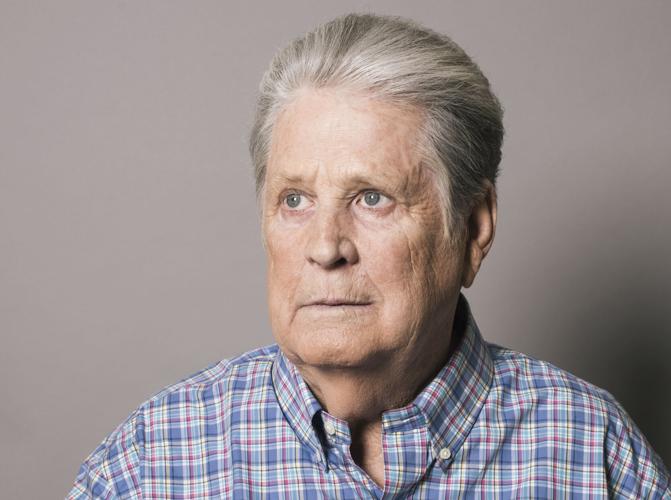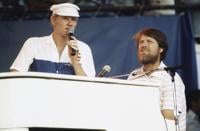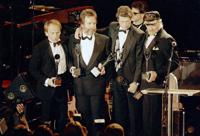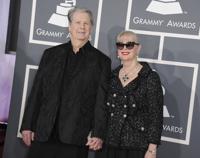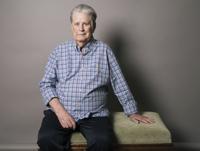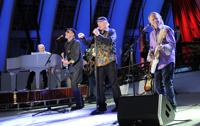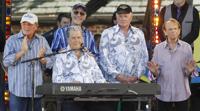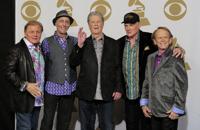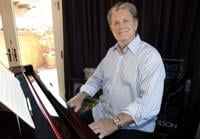Brian Wilson, the Beach Boys’ visionary and fragile leader whose genius for melody, arrangements and wide-eyed self-expression inspired “Good Vibrations,” “California Girls” and other summertime anthems and made him one of the world’s most influential recording artists, has died at 82.
Wilson's family posted news of his death to his website and social media accounts Wednesday. Further details weren't immediately available. Since May 2024, Wilson had been under a court conservatorship to oversee his personal and medical affairs, with Wilson’s longtime representatives, publicist Jean Sievers and manager LeeAnn Hard, in charge.
The eldest and last surviving of three musical brothers — Brian played bass, Carl lead guitar and Dennis drums — he and his fellow Beach Boys rose in the 1960s from local California band to national hitmakers to international ambassadors of surf and sun. Wilson himself was celebrated for his gifts and pitied for his demons. He was one of rock’s great Romantics, a tormented man who in his peak years embarked on an ever-steeper path to aural perfection, the one true sound.
The Beach Boys rank among the most popular groups of the rock era, with more than 30 singles in the Top 40 and worldwide sales of more than 100 million. The 1966 album “Pet Sounds” was voted No. 2 in a 2003 Rolling Stone list of the best 500 albums, losing out, as Wilson had done before, to the Beatles’ “Sgt. Pepper’s Lonely Hearts Club Band.” The Beach Boys, who also featured Wilson cousin Mike Love and childhood friend Al Jardine, were voted into the Rock and Roll Hall of Fame in 1988.
Wilson feuded with Love over songwriting credits, but peers otherwise adored him beyond envy, from Elton John and Bruce Springsteen to Smokey Robinson and Carole King. The Who’s drummer, Keith Moon, fantasized about joining the Beach Boys. Paul McCartney cited “Pet Sounds” as a direct inspiration on the Beatles and the ballad “God Only Knows” as among his favorite songs, often bringing him to tears.
Wilson moved and fascinated fans and musicians long after he stopped having hits. In his later years, Wilson and a devoted entourage of younger musicians performed “Pet Sounds” and his restored opus, “Smile,” before worshipful crowds in concert halls. Meanwhile, The Go-Go’s, Lindsey Buckingham, Animal Collective and Janelle Monáe were among a wide range of artists who emulated him, whether as a master of crafting pop music or as a pioneer of pulling it apart.
An endless summer
The Beach Boys’ music was like an ongoing party, with Wilson as host and wallflower. He was a tall, shy man, partially deaf (allegedly because of beatings by his father, Murry Wilson), with a sweet, crooked grin, and he rarely touched a surfboard unless a photographer was around. But out of the lifestyle that he observed and such musical influences as Chuck Berry and the Four Freshmen, he conjured a golden soundscape — sweet melodies, shining harmonies, vignettes of beaches, cars and girls — that resonated across time and climates.
Decades after its first release, a Beach Boys song can still conjure instant summer — the wake-up guitar riff that opens “Surfin’ USA”; the melting vocals of “Don’t Worry Baby”; the chants of “fun, fun, fun” or “good, good, GOOD, good vibrations”; the behind-the-wheel chorus “’Round, ’round, get around, I get around.” Beach Boys songs have endured from turntables and transistor radios to boom boxes and iPhones, or any device that could lie on a beach towel or be placed upright in the sand.
The band’s innocent appeal survived the group’s increasingly troubled backstory, whether Brian’s many personal trials, the feuds and lawsuits among band members or the alcoholism of Dennis Wilson, who drowned in 1983. Brian Wilson’s ambition raised the Beach Boys beyond the pleasures of their early hits and into a world transcendent, eccentric and destructive. They seemed to live out every fantasy, and many nightmares, of the California myth they helped create.
From the suburbs to the national stage
Brian Wilson was born June 20, 1942, two days after McCartney. His musical gifts were soon obvious, and as a boy he was playing piano and teaching his brothers to sing harmony. The Beach Boys started as a neighborhood act, rehearsing in Brian’s bedroom and in the garage of their house in suburban Hawthorne, California. Surf music, mostly instrumental in its early years, was catching on locally: Dennis Wilson, the group’s only real surfer, suggested they cash in. Brian and Love hastily wrote up their first single, “Surfin,’” a minor hit released in 1961.
They wanted to call themselves the Pendletones, in honor of a popular flannel shirt they wore in early publicity photos. But when they first saw the pressings for “Surfin,’” they discovered the record label had tagged them “The Beach Boys.” Other decisions were handled by their father, a musician of some frustration who hired himself as manager and holy terror. By mid-decade, Murry Wilson had been displaced and Brian, who had been running the band’s recording sessions almost from the start, was in charge, making the Beach Boys the rare group of the time to work without an outside producer.
Their breakthrough came in early 1963 with “Surfin’ USA,” so closely modeled on Berry’s “Sweet Little Sixteen” that Berry successfully sued to get a songwriting credit. It was their first Top 10 hit and a boast to the nation: “If everybody had an ocean / across the USA / then everybody’d be surfin,’ / like Cali-for-nye-ay.” From 1963-66, they were rarely off the charts, hitting No. 1 with “I Get Around” and “Help Me, Rhonda” and narrowly missing with “California Girls” and “Fun, Fun, Fun.” For television appearances, they wore candy-striped shirts and grinned as they mimed their latest hit, with a hot rod or surfboard nearby.
Their music echoed private differences. Wilson often contrasted his own bright falsetto with Love’s nasal, deadpan tenor. The extroverted Love was out front on the fast songs, but when it was time for a slow one, Brian took over. “The Warmth of the Sun” was a song of despair and consolation that Wilson alleged — to some skepticism — he wrote the morning after President John F. Kennedy was assassinated. “Don’t Worry Baby,” a ballad equally intoxicating and heartbreaking, was a leading man’s confession of doubt and dependence, an early sign of Brian’s crippling anxieties.
Stress and exhaustion led to a breakdown in 1964 and his retirement from touring, his place soon filled by Bruce Johnston, who remained with the group for decades. Wilson was an admirer of Phil Spector’s “Wall of Sound” productions and emulated him on Beach Boys tracks, adding sleigh bells to “Dance, Dance, Dance” or arranging a mini-theme park of guitar, horns, percussion and organ as the overture to “California Girls.”
By the mid-1960s, the Beach Boys were being held up as the country’s answer to the Beatles, a friendly game embraced by each group, transporting pop music to the level of “art” and leaving Wilson a broken man.
The Beach Boys vs. The Beatles
The Beatles opened with “Rubber Soul,” released in late 1965 and their first studio album made without the distractions of movies or touring. It was immediately praised as a major advance, the lyrics far more personal and the music far more subtle and sophisticated than such earlier hits as “She Loves You” and “A Hard Day’s Night.” Wilson would recall getting high and listening to the record for the first time, promising himself he would not only keep up with the British band, but top them.
Wilson worked for months on what became “Pet Sounds,” and months on the single “Good Vibrations.” He hired an outside lyricist, Tony Asher, and used various studios, with dozens of musicians and instruments ranging from violins to bongos to the harpsichord. The air seemed to cool on some tracks and the mood turn reflective, autumnal. From “I Know There’s an Answer” to “You Still Believe in Me,” many of the songs were ballads, reveries, brushstrokes of melody, culminating in the sonic wonders of “Good Vibrations,” a psychedelic montage that at times sounded as if recorded in outer space.
The results were momentous, yet disappointing. “Good Vibrations” was the group’s first million-seller and “Pet Sounds,” which included the hits “Sloop John B” and “Wouldn’t It Be Nice,” awed McCartney, John Lennon and Eric Clapton among others. Widely regarded as a new kind of rock LP, it was more suited to headphones than to the radio, a “concept” album in which individual songs built to a unified experience, so elaborately crafted in the studio that “Pet Sounds” couldn’t be replicated live with the technology of the time. Wilson was likened not just to the Beatles, but to Mozart and George Gershwin, whose “Rhapsody in Blue” had inspired him since childhood.
But the album didn’t chart as highly as previous Beach Boys releases and was treated indifferently by the U.S. record label, Capitol. The Beatles, meanwhile, were absorbing lessons from the Beach Boys and teaching some in return. “Revolver” and “Sgt. Pepper,” the Beatles’ next two albums, drew upon the Beach Boys’ vocal tapestries and melodic bass lines and even upon the animal sounds from the title track of “Pet Sounds.” The Beatles’ epic “A Day in the Life” reconfirmed the British band as kings of the pop world and “Sgt. Pepper” as the album to beat.
All eyes turned to Wilson and his intended masterpiece — a “teenage symphony to God” he called “Smile.” It was a whimsical cycle of songs on nature and American folklore written with lyricist Van Dyke Parks. The production bordered on method acting; for a song about fire, Wilson wore a fire helmet in the studio. The other Beach Boys were confused, and strained to work with him. A shaken Wilson delayed “Smile,” then canceled it.
Remnants, including the songs “Heroes and Villains” and “Wind Chimes” were re-recorded and issued in September 1967 on “Smiley Smile,” dismissed by Carl Wilson as a “bunt instead of a grand slam.” The stripped down “Wild Honey,” released three months later, became a critical favorite but didn’t restore the band’s reputation. The Beach Boys soon descended into an oldies act, out of touch with the radical ’60s, and Wilson withdrew into seclusion.
Years of struggle, and late life validation
Addicted to drugs and psychologically helpless, sometimes idling in a sandbox he had built in his living room, Wilson didn’t fully produce another Beach Boys record for years. Their biggest hit of the 1970s was a greatest hits album, “Endless Summer,” that also helped reestablish them as popular concert performers.
Although well enough in the 21st century to miraculously finish “Smile” and tour and record again, Wilson had been diagnosed with schizoaffective disorder and baffled interviewers with brief and disjointed answers. Among the stranger episodes of Wilson’s life was his relationship with Dr. Eugene Landy, a psychotherapist accused of holding a Svengali-like power over him. A 1991 lawsuit from Wilson’s family blocked Landy from Wilson’s personal and business affairs.
His first marriage, to singer Marilyn Rovell, ended in divorce and he became estranged from daughters Carnie and Wendy, who would help form the pop trio Wilson Phillips. His life stabilized in 1995 with his marriage to Melinda Ledbetter, who gave birth to two more daughters, Daria and Delanie. He also reconciled with Carnie and Wendy and they sang together on the 1997 album “The Wilsons.” (Melinda Ledbetter died in 2024.)
In 1992, Brian Wilson eventually won a $10 million out-of-court settlement for lost songwriting royalties. But that victory and his 1991 autobiography, “Wouldn’t It Be Nice: My Own Story,” set off other lawsuits that tore apart the musical family.
Carl Wilson and other relatives believed the book was essentially Landy’s version of Brian’s life and questioned whether Brian had even read it. Their mother, Audree Wilson, unsuccessfully sued publisher HarperCollins because the book said she passively watched as her husband beat Brian as a child. Love successfully sued Brian Wilson, saying he was unfairly deprived of royalties after contributing lyrics to dozens of songs. He would eventually gain ownership of the band’s name.
The Beach Boys still released an occasional hit single: “Kokomo,” made without Wilson, hit No. 1 in 1988. Wilson, meanwhile, released such solo albums as “Brian Wilson” and “Gettin’ In Over My Head,” with cameos by McCartney and Clapton among others. He also completed a pair of albums for the Walt Disney label — a collection of Gershwin songs and music from Disney movies. In 2012, surviving members of the Beach Boys reunited for a 50th anniversary album, which quickly hit the Top 10 before the group again bickered and separated.
Wilson won just two competitive Grammys, for the solo instrumental “Mrs. O’Leary’s Cow” and for “The Smile Sessions” box set. Otherwise, his honors ranged from a Grammy lifetime achievement prize to a tribute at the Kennedy Center to induction into the Songwriters Hall of Fame. In 2018, he returned to his old high school in Hawthorne and witnessed the literal rewriting of his past: The principal erased an “F” he had been given in music and awarded him an “A.”

